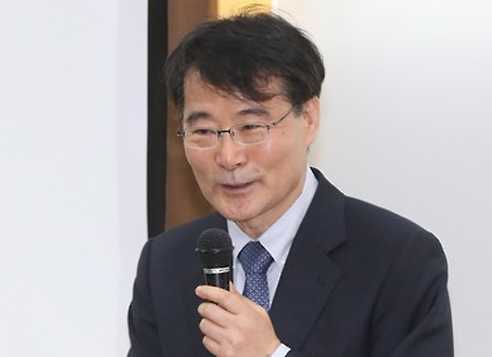President Moon Jae-in’s chief secretary for economic policies said Sunday that the government’s planned 10 trillion won ($9 billion) supplementary budget would help reduce inequality.
Jang Ha-sung, the chief presidential secretary for economic policies, called the budget a “timely and effective” tool to resolve South Korea’s deepening economic polarization, stressing that the nation’s export-driven growth had failed to create more jobs.
Jang said that a considerable portion of the extra budget plan will be spent for the income brackets in between the lowest and the bottom 40 percent, to improve the quality of their lives and narrow the wage gap.
 |
Chief presidential secretary for economic policies, Jang Ha-sung (Yonhap) |
“The supplementary budget plan is not a plan for adjusting (the nation’s) growth but is a countermeasure to improve the quality of the lives of people suffering,” he said in his first briefing at the press center of the presidential office.
“Without creating jobs and (improving) incomes, (the government) cannot establish a long-term growth plan.”
Jang’s remarks came a day before the government plans to announce its bill on the supplementary budget following approval by the Cabinet on Monday.
The plan backs President Moon’s campaign pledge to create up to 810,000 new jobs in the public sector alone during his term that ends in May, 2022.
The Moon administration believes that enhancing income levels and creating more jobs for people in the lower income brackets could spur domestic consumption.
Consumer spending is a major driver of economic growth in many countries, but the portion of domestic spending by South Koreans in the nation’s gross domestic product is one of the lowest among the member countries of Organization of Economic Cooperation and Development, he said.
The focal point of the extra budget plan is to resolve the widening wage gap and social tension between the haves and the have-nots.
The top 20 percent of income earners in South Korea made 9.32 times more than those in the bottom 20 percent at the end of 2016, up from 8.24 times more a year earlier.
The average income in the bottom 20 percent also declined 9.8 percent on-year in 2016, he said, noting that their income continued to drop 5.2 percent on-year in the first quarter of 2017. South Korea’s jobless rate has hit 4.2 percent in April, a record high in 17 years, while the youth unemployment rate also reaching a record high level of 11.2 percent in the same month.
”This means that a decline in the income of those in the lower income bracket is not a one-time problem, but is a structural problem,” he said.
The government will seek to spend the extra budget on expanding child care, retirement allowances and day care services. The budget will be spent on increasing the number of government officials and expand jobs in the social services sector while excluding infrastructure projects pushed by municipal offices, he said.
The government also planned to establish fair market principles by narrowing the income gap between workers at large and small companies, he added.
Asked about the real estate market, the corporate governance expert said he was watching the situation closely and would consult with the Land Ministry on plans to dampen price increases. The plan is to implement a heavier financial regulation based on the debt service ratio, meaning the percentage of household debt service payments of disposable income.
But he declined to comment more on real estate policy, saying that it could give misleading signals.
Jang was a business professor at Korea University before joining the presidential office last month. He was also a well-known activist for transparent corporate governance at South Korean conglomerates, which earned him the nickname “chaebol sniper.”
By Cho Chung-un (
christory@heraldcorp.com)








![[Herald Interview] How Gopizza got big in India](http://res.heraldm.com/phpwas/restmb_idxmake.php?idx=644&simg=/content/image/2024/11/20/20241120050057_0.jpg)